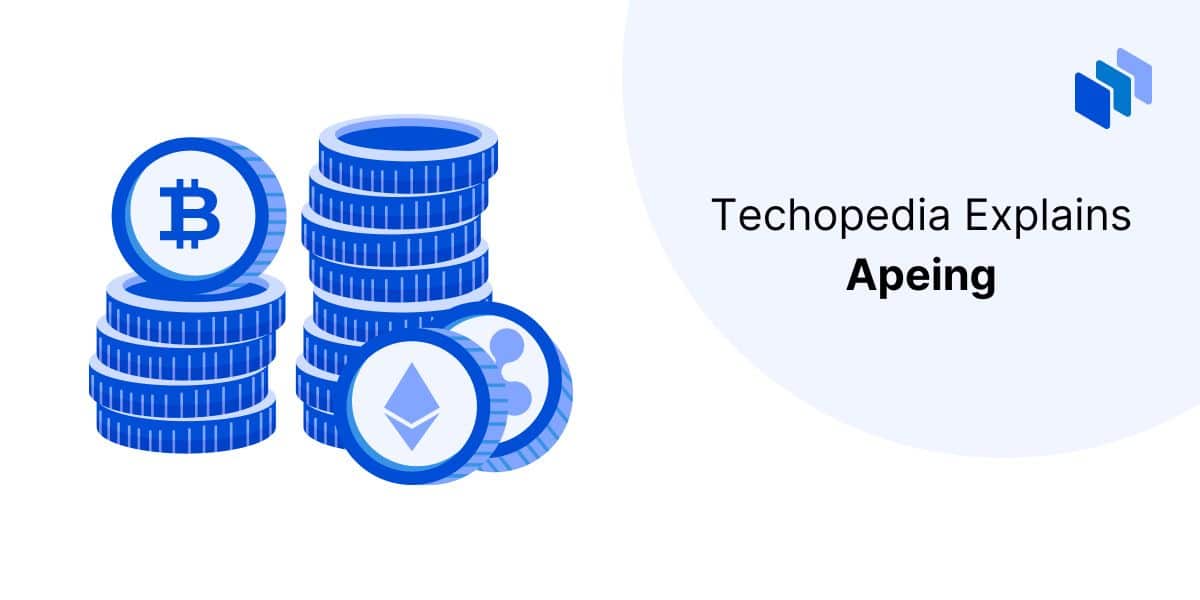What is Apeing?
Apeing is a crypto slang that describes the act of purchasing a newly launched project’s token without conducting thorough research following its debut.
This practice is rooted in the belief that crypto investors might miss out on potential profits if they spend too much time conducting research on the blockchain protocol. Such decisions are often influenced by the fear of missing out (FOMO) on speculative gains.
The term ‘ape’ characterizes the impulsive and uninformed mindset some investors display when they invest in project tokens without due diligence.
When investors engage in apeing, they essentially mimic the trading decisions of others without the necessary data to support their investment choices.
The History of Apeing
Apeing was first recorded in the crypto space in 2020 following the decentralized finance (DeFi) boom.
This era, known as “DeFi Summer,” was marked by heightened blockchain activities, during which numerous new and unannounced project tokens were introduced as the decentralized economy gained momentum.
Early investors in these project tokens quickly reaped substantial gains, sparking a surge of accounts of these high yields on social media networks.
This led to a wave of people attempting to imitate this unsystematic process, investing in new projects with the hope of capitalizing on significant gains before their tokens achieved wider recognition.
With investors making sizable gains within a short period, the term caught like wildfire.
Nonetheless, apeing became a recognized term in 2021 during the GameStop saga spearheaded by the subreddit community WallStreetBets.
- On r/WallStreetBets, Redditors acquired stocks of underperforming companies like GameStop, Nokia, and Blackberry.
- Their objective was to trigger a short squeeze out of the investments of hedge funds and other financial institutions that shorted these companies’ stocks at the time.
- This event led to the widespread adoption of the term ‘apeing’ as part of the investing lexicon.
Relationship Between FOMO and Apeing
Apeing occurs when investors succumb to FOMO, making it a crucial piece in the thoughtless imitation of other investors’ trading strategies.
Investors who engage in apeing essentially dive into trades without a safety net to mitigate potential risks should their trading strategies fail to deliver.
Many frequently exhibit one or more of the following characteristics:
- Greed: Investors who engage in apeing often seek to accumulate all their profits through a single trade. They hold the belief that this approach will enable them to attain substantial gains since they see everyone else investing in the same digital asset. However, this essentially reflects the influence of greed, and such investors frequently find themselves losing the majority of their funds due to the absence of adequate diversification.
- Herd Mentality: Investors who succumb to apeing and FOMO tend to mirror the trading decisions of others without the necessary data to inform their choices. This one-sided approach to investing often compels them to either purchase or sell a particular cryptocurrency.
- Impatience: Investors driven by FOMO tend to display impatience, hastily entering trades without heeding the necessary signals. For example, when a cryptocurrency’s price surges rapidly, a FOMO-driven investor might act impulsively, fearing missing out on the price shift. This often causes them to overlook the appropriate trading signals and suffer losses.
- Zero Long-term Trading Perspectives: Apeing generally encourages investors to focus on the present value of an asset instead of its long-term potential. This often makes prioritize immediate gains over sticking to a long-term trading strategy.
The Bottom Line
Apeing incurs huge risks with minimal chances of success. The general idea missed out by most investors who jump on new shiny project tokens is that once they hit mainstream social media, the chances of gaining profit significantly drop.
Furthermore, an increasing number of crypto projects employ social media influencers to promote their tokens. Often, these influencers lack in-depth research on the project tokens and are simply paid to endorse these assets.
Therefore, as an investor, it’s essential to always do your own research (DYOR) before considering an investment in any project token.






